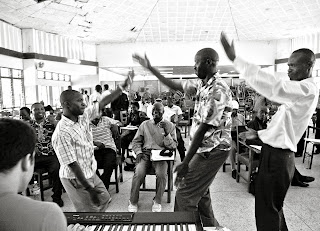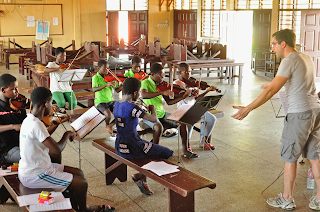Freetown Prisons
Photo by Tariq Zaidi (www.tariqzaidi.com)
The car doesn’t arrive, our guide is unreachable, and when alternative transport is found, it breaks down. “I am in Sierra Leone, and a lot of things can go wrong,” I was saying to myself, as the driver stepped out and started kicking the engine of his taxi. He kept abusing the car, which should have been off the roads before I was born, kicking and shaking it with all his strength, as if it had misbehaved, and was in need of some serious punishment. We were two hours late for the concert, stuck in an unexpected street, somewhere in the hills of Freetown, yet this was a serious, intimate moment for the driver, so there was no logic to save the taxi from the beating. My phone rang. It was the warden. “We can’t keep the prisoners out any longer. If you are not here in 15 minutes we need to move on.” And as I was resigning to the prospect of not playing this recital in the ominous Pademba Road Freetown prisons, the car, affected by a powerful African black magic, roared and started. “We are on our way,” I muttered on the phone.
As the heavy door rattled, I felt my ribs screaming and my
skull squashed by the sounds of the cold steel. I was told once that the
difference between a person drowning at sea and the one trying to save them is
only in the way they enter the water. I tried to keep this thought alive,
taking the step across the line separating freedom from captivity, entering a
world that did not belong to the world I knew, an independent universe, a dark
mirror to my familiar one. As we walked in, the guard, that just a moment ago
had politely checked our documents and courteously registered us in the visitors’ log, turned to me and said
firmly, “Listen to me carefully now. From this moment on, you will do exactly
as I say. If I say stop, you will stop. If I say turn around and run, you will
run. Do you understand?” He said this in a tone reflective of his lifelong
habit of demanding respect and obedience. It seemed like a rhetorical question,
but I nodded, trying to show no emotion.
As we were entering the yard, Tariq, the photographer
travelling with me, turned to me and said, “I don’t like this,” and then continued
with an elaborate evacuation plan should things go wrong, which included
running fast, climbing a 7-foot water tank, and jumping over barbed wire to the
opposite side. He has travelled to some of the most dangerous places on earth,
yet, like me, he felt the rattling in his ribcage as the door hammered behind
us, letting fear take over his mind, that inside this structure, we too can be
forgotten.
I chose the wrong piece of music to start the performance.
My hands felt as if not mine, cold and foreign, hearing the thumping of my
heartbeat pushing against my throat. The disorientation of adrenaline was
taking over my body as the notes of Tchaikovsky Intermezzo from the Nutcracker
were flying across the air, blasting in full power. Like a child’s singing in a
steel factory, the music was too
weak to be heard. Then, the piano was placed in the middle of the dusty
yard, and guards, dressed in loose, dull grey uniforms, holding sticks as
weapons, surrounded me as I sat to play. Several prisoners were wandering
around the stage area, indistinctively dressed in similar grey uniforms of a
different shade. These, limited in number, well-behaved inmates, had the
privilege of walking in the yard. In front of me, a tall fence separated us
from the rest of the yard, a place where more than one thousand prisoners
lived, in a space built for three hundred. I tried not to look up, as the
romantic music of Tchaikovsky felt like a parody in this space. The prisoners
behind the fence were climbing on top of each other, yelling and screaming as
if at a football match, more interested in the presence of foreign visitors,
and not even able to hear the music. They were dressed in rags, and looked as
if out of a Victor Hugo novel, wearing their own dirty, worn out clothes, probably
the same ones they were wearing when arrested and brought in, years ago. Some
of them were in their cells, in the old, solid compound behind everything else,
waving their hands through the bars. These were the death row inmates, not
allowed out, apart from specific times, separated from the rest. Their cells, I
was told later, face the gallows.
Prisons were my childhood nightmare. The lack of space to
breathe, the wild, loud shouts, the miserable existence, all belonged to the
hell that is an African prison and I chose to come in it to play a recital. My
idealistic beliefs that music is one of the lost things needed in a prison were
fading, drowning in the screams of those in captivity. The music wasn’t
working. I had to do something about it. Change of pace. I put away the
delicate, romantic Tchaikovsky, and started playing the Harmonious Blacksmith
by Handel. For a few seconds the change went unnoticed, lost in the yells and
the laughs behind the fence. Then, an invisible wave, as if a secret water cannon
had started pouring water all across the audience, the rhythm got noticed. The
basis of human consciousness, rhythm, of my heartbeat in my throat, of the
Handel quavers bouncing freely across this isolated universe. One by one, the
invisible splash hit the inmates, and they started moving, until the whole
prison population was jumping up and down to the rhythm of this unfamiliar
music. It could have been hip hop, or an African war dance, or Handel, it
didn’t make any difference, and suddenly the experience was shared, by the
foreign visitor, the guards and the inmates in dirty rags. I couldn’t tell any
longer if it was my heartbeat that I was feeling, or the ground shaking under
my feet, from the continued bouncing of a thousand human bodies. Even before
the last note brought the piece to an end, the cheering was loud enough to
bring down the walls and fences. The guards became uneasy. “OK, you played
enough, you should go now,” I was commanded, but before responding, I started
playing a Greek dance, arranged for the piano by Hatzhidakes. The shouting and
jubilation continued with the same momentum. African dance to Greek music,
unconfined moving, free and spectacular. I sensed the excitement of
communication running through my fingers, and I felt a heat unfamiliar in this
place: freedom.
As we were rushed out quickly a few minutes later, our guide
Alusine stayed behind. He was talking to someone behind the fance, and the
guards had to force him out, pulling him by the arm. “I found a friend, Mr.
Panos,” he said. “We are from the same community. I can’t believe he is here.
He stole something two years ago to feed himself, and he is still awaiting
trial. He said the music reminded him of the time we were children, when we
were both free.”


Comments
Post a Comment